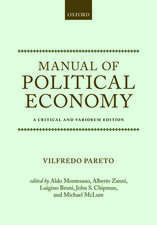The Rise and Fall of Elites: Application of Theoretical Sociology
Autor Vilfredo Paretoen Limba Engleză Hardback – 25 sep 2017
This dynamic involves a shifting balance among the countervailing forces of centralization and decentralization of power, economic expansion and contraction, and liberalism versus traditionalism in public sentiment. By 1920, Pareto had developed a scheme for predicting shifts in magnitude of these forces and subsequent change in the character of society. This book will be of interest to students, teachers, or general readers interested in political science, sociology and late-nineteenth/ early-twentieth century social theory.
| Toate formatele și edițiile | Preț | Express |
|---|---|---|
| Paperback (1) | 384.01 lei 6-8 săpt. | |
| Taylor & Francis – 30 ian 1991 | 384.01 lei 6-8 săpt. | |
| Hardback (1) | 1104.62 lei 6-8 săpt. | |
| Taylor & Francis – 25 sep 2017 | 1104.62 lei 6-8 săpt. |
Preț: 1104.62 lei
Preț vechi: 1347.10 lei
-18% Nou
Puncte Express: 1657
Preț estimativ în valută:
211.40€ • 218.38$ • 175.93£
211.40€ • 218.38$ • 175.93£
Carte tipărită la comandă
Livrare economică 26 martie-09 aprilie
Preluare comenzi: 021 569.72.76
Specificații
ISBN-13: 9781138538269
ISBN-10: 1138538264
Pagini: 132
Dimensiuni: 152 x 229 x 10 mm
Greutate: 0.32 kg
Ediția:1
Editura: Taylor & Francis
Colecția Routledge
Locul publicării:Oxford, United Kingdom
ISBN-10: 1138538264
Pagini: 132
Dimensiuni: 152 x 229 x 10 mm
Greutate: 0.32 kg
Ediția:1
Editura: Taylor & Francis
Colecția Routledge
Locul publicării:Oxford, United Kingdom
Cuprins
INTRODUCTION 1 Some Sociological Laws 2 The Ascending Period of the Religious Crisis 3 The Decline of the Old Elite 4 The Rise of the New Elite 5 The Subjective Phenomenon
Descriere
Combining a thorough introduction to the work of nineteenth and early twentieth-century Italian social theo-rist Vilfredo Pareto with a highly read-able English translation of Pareto's last monograph, "Generalizations," this work illus-trates precisely how and why demo-cratic forms of government undergo decay and are eventually re-invigo-rated








